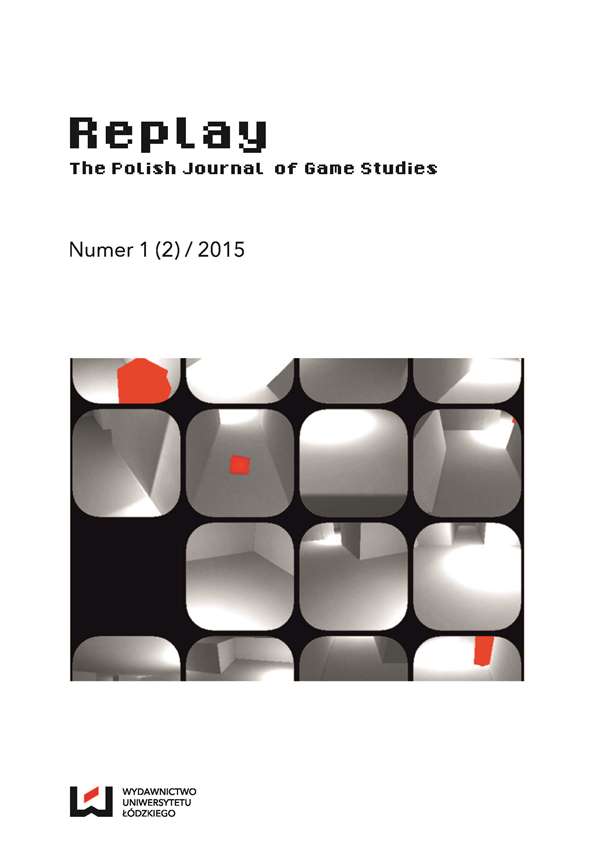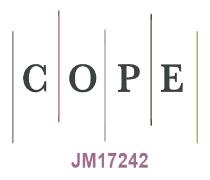Rules versus immersion: engagement in game’s narrative and engagement in formal system of the game
DOI:
https://doi.org/10.18778/2391-8551.02.03Keywords:
rules in video games, immersion, engagement, MDAAbstract
Rules and narratives in video games had a complicated relationship for many years. In game studies this conflict became evident in ludology versus narratology debate, in video game culture critics and players talk about ludo-narrative dissonance. Both of those phenomena express the popular belief that rules and story in videogames oppose each other, that strategic or tactical engagement and narrative immersion cannot coexist in one game. The following article confronts the problem of, supposedly, opposing types of engagement. To understand different aspects of engagement several concepts of immersion are recalled, beginning with those rooted in literary studies by Janet H. Murray, Marie-Laure Ryan and Katarzyna Prajzner, through game specific concept of Laura Ermi and Frans Mäyrä to post-immersion concepts of Gordon Calleja. In the next section of the paper two analyses of specific types of engagement are presented: game formal system engagement in Angry Birds [Rovio Entertainment, 2009] and narrative immersion in The Walking Dead series [Telltale Games, 2012]. The article concludes with a list of mechanical features of a video game that facilitates either engagement in formal system of the game or game’s narrative.
References
Adams, Ernest. 2004. The Designer’s Notebook: Postmodernism and 3 Types of Immersion, Gamasutra, http://www.gamasutra.com/view/feature/130531/the_designers_notebook_.php.
Google Scholar
Calleja, Gordon. 2007. Revising Immersion: A Conceptual Model for the Analysis of Digital Game Involvement. Proceedings of the 2007 DiGRA International Conference: Situated Play.
Google Scholar
Calleja, Gordon. 2011. In-game from immersion to incorporation. Cambridge, Mass: MIT Press.
Google Scholar
DOI: https://doi.org/10.7551/mitpress/8429.001.0001
Csíkszentmihályi, Mihály, 2005, Przepływ: jak poprawić jakość życia: psychologia optymalnego doświadczenia, Taszów: Biblioteka Moderatora.
Google Scholar
Ermi, Laura, Frans, Mäyrä. 2010. Fundamental components of the gameplay experience: analysing immersion. w: Suzanne de Castell and Jennifer Jenson (red.), Proceedings of Chancing Views – Worlds in Play. Digital Games Research Association’s Second International Conference. Vancouver: DiGRA and Simon Fraser University.
Google Scholar
Francis, Tom. 2012, Mass Effect 3 Narrative Mode and Action Mode Explained, PC Gamer, http://www.pcgamer.com/mass-effect-3-narrative-mode-and-action-mode-explained/.
Google Scholar
Galloway, Alexander R. 2006, Gaming, Essays on Algorithmic Culture, Minneapolis: Minneapolis University Press.
Google Scholar
Grabarczyk, Paweł. 2015, O opozycji hardcore/casual, „Homo Ludens” 1(7), [w druku].
Google Scholar
Hunicke, Robin, LeBlanc, Mark, Zubek, Robert. 2004, MDA: A Formal Approach to Game Design and Game Research, http://www.cs.northwestern.edu/~hunicke/ MDA.pdf.
Google Scholar
Juul, Jesper. 2005, Half-Real – Video Games between Real Rules and Fictional Worlds, Cambridge: MIT Press.
Google Scholar
Koster, Raph. 2005. A Theory Of Fun In Game Design. Scottsdale: Paraglyph Press.
Google Scholar
Murray, Janet. 1998, Hamlet on the Holodeck: The Future of Narrative in Cyberspace, Cambridge: MIT Press.
Google Scholar
Murray, Janet. 2010, Od gry-opowiadania do cyberdramy, przeł. M. Filiciak, w: Filiciak Mirosław (red.) Światy z pikseli. Antologia studiów nad grami komputerowymi, Warszawa: Wydawnictwo SWPS Academica.
Google Scholar
Prajzner, Katarzyna. 2009. Tekst jako świat i gra: modele narracyjności w kulturze współczesnej. Łódź: Wyd. Uniwersytetu Łódzkiego
Google Scholar
Ryan, Marie-Laure. 2001. Narrative as virtual reality immersion and interactivity in literature and electronic media. Baltimore, Md: Johns Hopkins University Press.
Google Scholar
Bethesda Game Studios, 2011, The Elder Scrolls V: Skyrim [PC] USA, Bethesda Softworks.
Google Scholar
BioWare, 1998–2001, Baldur’s Gate [PC], USA, Black Isle Studios, Interplay.
Google Scholar
BioWare, 2007–2012, Mass Effect [PC], USA, Microsoft Studios, Electronic Arts.
Google Scholar
Blizzard Entertainment, 2004, World of Warcraft [PC] USA, Activision Blizzard
Google Scholar
Blizzard Entertainment, 2011, Starcraft II: Wings of Liberty [PC] USA, Blizzard Entertainment.
Google Scholar
Crowther William and Woods Don, 1977, Collosal Cave Adventure [PDP-10] USA.
Google Scholar
David Cage, Quantic Dream, 2005, Fahrenheit, [PC] PL, Atari.
Google Scholar
Gearbox Software, 2009–2014, Borderlands [Xbox 360], USA, 2K Games.
Google Scholar
Infinity Ward, 2003–2014, Call of Duty [PC], USA, Activision.
Google Scholar
Lucasfilms Games, 1990, Secret of Monkey Island [PC], USA, Lucasfilms Games.
Google Scholar
Midway Games, 1992–2011, Mortal Kombat [Arcade, PC, Xbox 360], USA, Acclaim Entertainment, GTInteractive.
Google Scholar
Nicalis, 2014, Binding of Isaac: Rebirth [PC] USA, Nicalis.
Google Scholar
Ragnar Tørnquist, Funcom, 1999 The Longest Journey: Najdłuższa podróż [PC] PL, CD Projekt.
Google Scholar
Rocksteady Studios, 2009–2011, Batman Arkham [PC], USA Warner Bros Interactive, Eidos Interactive.
Google Scholar
Rovio Entertainment, 2009, Angry Birds [iOS], USA, Chillingo.
Google Scholar
Telltale Games, 2012–2014, The Walking Dead [PC], USA, Telltale Games.
Google Scholar
Dave Arneson, Gary Gygax, 1974–2008, Dungeons and Dragons, USA, Tactical Studies Rules, Wizards of the Coast.
Google Scholar
Downloads
Published
How to Cite
Issue
Section
License

This work is licensed under a Creative Commons Attribution-NonCommercial-NoDerivatives 3.0 Unported License.










